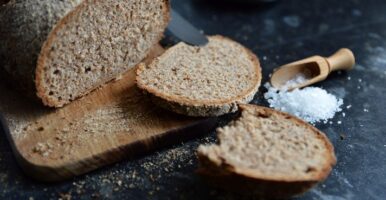Navigating Life with Bread, Sweat and Tears
QUESTION:
After the Israelites crossed through the Red Sea on dry ground, they came to a pool of bitter water (Ex. 15:23). Moses threw a tree into the water, and it became drinkable. What kind of tree was it?
ANSWER:
[This explanation is based on personal notes from a lecture by Rabbi Yosef Yitzchak Jacobson. He explained how it is connected with the Jewish custom to dip one’s bread into salt three times.]

Three cures for bitterness
In Exodus 15:23-25, Moses called out to G-d at the place called Marah. The name means “Bitter,” because the water there was too bitter to drink. In response, G-d showed Moses a specific tree. When Moses threw it into the bitter water, the water became sweetened so it could be used for drinking.
There are three opinions as to what the tree was:
1) A bitter tree, that absorbed the bitterness of the water into itself
2) A branch of a willow bush that grows beside sweet water. It contains sweet water, and it sweetened the bitter water
3) The Tree of Life from the Garden of Eden (which represents the hidden inner G-dly dimensions of Torah). This will nullify any bitterness in the world.
When Adam was being exiled from the Garden of Eden, G-d told him that he would have to procure his bread through the (salty) sweat of his brow. This was a very bitter thing. From then on, it has involved dealing with an aspect of bitterness in the course of one’s life. Likewise, salt has an aspect of bitterness in its taste (if eaten straight, in quantity).
This relates to a spiritual meditation while following the Jewish custom to dip one’s bread in salt before eating it. If there is no salt available, the piece of bread can be dipped onto bread, since bread contains salt. (The custom was instituted as a reminder that salt was added to the sacrifices that were brought in the Holy Temple; see Leviticus 2:13.)
Dreaming, forgiving, and having mercy
The Jewish meditation is to have in mind the words “chalom” (dream), then “machal,” (forgive), and then “chamal,” (have mercy/compassion) while dipping the bread three times into salt. In Hebrew, these words all have exactly the same three letters, but in different permutations. (In Hebrew, the vowels are not letters.) Here are the relevant words made from permutations of these letters:
“Bread” is “lechem”
“Salt” is “melach”
“Dream” is “chalom”
“Forgive” is “machal”
“To have mercy” is “chamal”
(where “ch” represents the Hebrew letter chet, the first letter in “Chanukah”)
Also, with the same three letters, the word “lacham” means both “to eat” and “to wage a war,” and “lachem” is a war or a battle.
We have to fight a battle in this mundane physical world to procure our sustenance, which is represented by bread. The mundane world apparently contains evil that has power to harm. People can get actually physically harmed or abused, G-d forbid, which leads to emotional and spiritual embitterment.
There are five ways to deal with this, in ascending spiritual order.
Five approaches to emotional healing
1) Fighting back, engaging directly against the evil. This battle (“lachem“) is represented by dipping the bread (“lechem“) into bread (if no salt/”melach” is available).
2) Accepting that this is our lot and mission in life, as decreed by G-d, and bearing the burden. This is representing by dipping the bread into salt (“melach“).
3) Realizing that although there are bitter things in life, it is really like a dream. G-d really is all Good, and only goodness comes from Him. Sometimes the goodness is disguised as evil and bitterness, but that is really like a dream. The inner reality is that it is good. Sometimes we are blessed to see this, and sometimes not. Or sometimes it is only much later in one’s life, or much later in history, that the good becomes apparent.
But soon, when the Messianic Era arrives, we will wake up from the dream of spiritual exile. Then the truly good purpose of everything that G-d has done will be revealed – because it was all leading to the Messianic Era. Thus one has in mind “chalom“ (dream) when he dips his bread in salt the first time.
4) Finding the remnant of true and still-undamaged goodness within ourselves, by looking deeper than the bitterness and hurt. Through this we can sincerely forgive those who have hurt us, and not wish that any ill or revenge will come upon them, because that is the righteous way that a person of goodness and faith should follow. Thus, one has in mind “machal“ (forgive) when he dips his bread in salt the second time.
5) Taking the lesson from the bitterness and hurt that we have experienced, and applying it positively through positive actions in our life. This requires bringing out our sincere mercy for others who have suffered, and are suffering. We need to go out of our way to help them and lessen their pain. Because out of mercy, we don’t want them to have to suffer as we have suffered.
By helping others in this way, as a positive outgrowth of our own hardships (for example,. happily giving some of our hard-earned money to help poor people), it changes our own bitterness into sweetness. Thus one has in mind “chamal“ (to have mercy) when he dips his bread in salt the third time.
This last meditation (to have mercy) focuses on an inner intent (as contained in the Tree of Life) of the decree upon Adam. This is how negativity in the world (which arises because G-d is temporarily hidden) can be turned over to reveal the positive. This is through our efforts to reveal that the Divine image that G-d instilled in us, as a reflection of Him, has an inherent connection to goodness. By bringing this out in our deeds of goodness and kindness, we can make the world into a receptive dwelling place for G-d and His revelation.

Some additional insights from the Director of Asknoah.org:
Note further that each of the 5 words,
“bread” — “lechem”
“salt” — “melach”
“dream” — “chalom”
“forgive” — “machal”
“to have mercy” — “chamal”
is made up of permutations of three Hebrew letters: chet (= 8), lamed (= 30), mem (= 40)
So each adds up to 8 + 30 + 40 = 78
7 + 8 = 15, which is the numerical value of the Divine Name Y-H which is on a higher spiritual level than the revealed spiritual worlds. This is the Divine Name used by G-d in Exodus 17:16, describing the war of G-d against Amalek.
The original battle (“lachem” in Hebrew) of the Israelites with the evil Amalekites, at the end of Exodus ch. 17, came immediately after (and because) the Israelites complained to G-d about their lack of water, at the beginning of ch. 17. They should not have complained (which was the result of their lack of faith in G-d), because in the chapter before, G-d brought down the mannah from Heaven for them to eat. And in the chapter before that, G-d showed to Moses the special tree that would sweeten the bitter water.
Therefore, due to their continuing lack of faith, Amalek was allowed to attack them and attempt to cool off their excitement about progressing toward Mount Sinai to receive the Torah from G-d.
Likewise, each person’s personal battle to procure his daily bread distracts him from being excited about constantly observing his part in G-d’s Torah – the Seven Noahide Commandments for Gentiles (which Moses taught to the Israelites at Marah after the water was sweetened for them; see Exodus 15:25), and the 613 Jewish Commandments for Jews.
The prophecy stated by Noah’s father
In the words of Lamech (also called Lemech), when he prophesied about the future accomplishments of his son Noah (Genesis 5:29) –
“This one [Noah] will bring us rest from our work and the toil of our hands, from the ground which G-d has cursed.”
That is, Noah would bring as easing of the decree upon the descendants of Adam, that one must get his bread from the sweat of his brow. Noah accomplished this by inventing agricultural tools, including the plow.
This prophecy is being further fulfilled in our time, as the world becomes more united through the global observance of the Seven Noahide Commandments and faith in the One True G-d. When the true Messiah comes, speedily in our days, competition and envy will be set aside, and replaced by true cooperation and brotherhood, which will bring prosperity and happiness for all. In that blessed time, the nations will complete the process of “beating their swords into plowshares.” (Isaiah 2:4)
By Dr. Michael Schulman, Director of Ask Noah International








